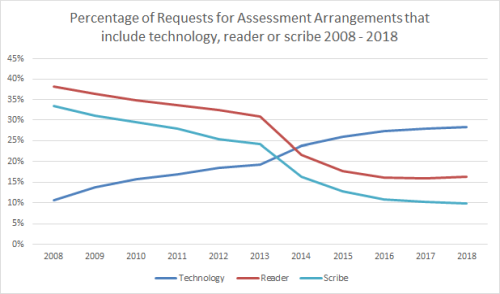What are question digital papers?
They are digital (PDF) versions of the ordinary SQA (or other exam board) exam papers or assessments.
They are for learners who:
- have difficulty with reading ordinary exam papers,
- or with writing or recording responses.
Schools make a request to SQA or your exam board for digital papers for students who have difficulty with the traditional paper examination.
Candidates can use a range of different technologies to read the paper and type answers and responses on a computer, iPad or other device.
What do they look like?
There are 2 types of digital paper:
- 'Question and answer' digital papers
- 'Question only' digital papers
- 'Question and answer' papers
A PDF file with answer boxes in the paper itself for candidates to type their answers on screen. - 'Question only' papers
A PDF file without answer boxes - candidates type their answers with a word processor or with a 'Digital Answer Booklet' (in PDF or Word format).
 What difference do digital papers make to pupils?
What difference do digital papers make to pupils?
By using digital papers in examinations, and by using accessible digital learning materials more generally in schools, we can help young people fulfil their potential.
![]() Education Scotland produced a video of pupils talking about the impact that digital exams had on their performance in SQA exams.
Education Scotland produced a video of pupils talking about the impact that digital exams had on their performance in SQA exams.
![]() Dawn Roberts and her son Innes provide a great insight into digital technology for assessments in their video workshop for the 2020 Dyslexia Scotland education conference.
Dawn Roberts and her son Innes provide a great insight into digital technology for assessments in their video workshop for the 2020 Dyslexia Scotland education conference.
Consider this...
Can you be a...
- Successful learner
if you can't read learning materials and examination papers? - Confident individual
if you depend on others to read or write for you in exams? - Responsible citizen
if you don't have access to information? - An effective contributor
if you can't speak, write or communicate independently?
Digital papers can help you become...
- a more successful learner
if you can read learning materials and assessments when you want, where you want; - a more confident individual
if you don't have to rely on a reader or scribe; - a more responsible citizen
if you are learning to be independent and self-reliant; - a more effective contributer
if you have learned the ways and means to contribute yourself.
Reduce reliance on readers and scribes
In 2024 in Scotland, there were:
- 12,780 requests for the use of a human reader;
- 6,215 requests for a scribe for SQA exams.
That's up to 18,995 instances where pupils were:
- sitting in separate rooms in schools in Scotland,
- with a member of staff reading and/or scribing,
- with a personal invigilator.
Widespread use of scribes and readers raises questions about independence and possibility even consistancy of assessments across the country. In addition, schools have difficulty finding sufficient accommodation and staff, and there are significant costs involved in paying for staff and invigilators.
Our research has shown that digital papers and technology, with accessibility tools such as text-to-speech, can provide many students with a more independent and less expensive alternative to readers and scribes.
The good news is that technology is gradually replacing the use of reader/scribes in examinations and technology support is now more popular than either reader or scribe. Despite this, there is still some way to go because we know that technology is still not used to it's full potential in many schools.

Digital papers and assistive technology in assessments in 2024-2025
Digital learning in Scotland has changed significantly since digital question papers were first offered by SQA in 2008:
- In many areas of Scotland, every pupil in secondary school has their own digital device - usually and iPad or a Chromebook.
- Modern Chromebooks, iPads and Windows laptop have excellent accessibility tools built in - such as text-to-speech; spellcheckers and speech to text dictation.
- Teachers and educators are routinely using digital learning environments such as Glow, Microsoft Office 365 and Google Workspace for Education.
- Digital learning is becoming the 'normal way of working' for all students, not only students with additional support needs.
However,
- Our research indicates that few if any pupils are able to use their personal Chromebooks or iPads in examinations.
- This is partly because SQA policy prohibits the use of internet in examinations, and internet is required to manage modern devices and digital learning.
- Some accessibility tools, particularly speech-to-text dictation, require internet, and so students cannot use these tools in examinations.
- But SQA have now changed the policy so that internet-connected devices can be used, provided they are secure!
- It's also because it is difficult to configure iPads and Chromebooks to be secure for examinations.
- Which we are working on - in the 2024 exam diet, pupils at Larbert High used exam.net to access their exams on their iPads.
- Apps or extensions required to access Digital Question Papers are not available on iPads and Chromebooks in some local authorities.
- Many centres find it difficult to provide sufficient Windows computers for use in examinations.
- All students, not just students who require assessment arrangements, are developing digital skills and yet examinations are still paper-based. Students are therefore unable to use their 'normal way of working' in examinations.
So there has been some good progress over the past year and we hope that this will continue into 2025.
The 2023 Independent Review of Qualifications and Assessment and reform of SQA are likely to result in greatert use of online assessment but the current examination format will be with us for a few years yet, and so we are working with SQA and colleagues in schools and centres across the country to investigate tools and process for using Chromebooks, iPads and Windows devices in examinations.
Digital papers, a bit of history

In 2002, SQA asked CALL to investigate the use of digital technology for candidates with disabilities and a key recommendation was that papers should be made available in a digital format, so that candidates could easily open the document and use assistive technologies to read the paper and write answers. We researched the features that were required with digital question papers and found that staff wanted papers that:
- had the same appearance and layout as the paper, so that students could use both digital and hardcopy during an exam;
- could be magnified and adjusted (for example by changing foreground and background colours on screen);
- would allow students to type directly into the paper on screen;
- were compatible with assistive technologies such as screen and text readers, specialised keyboards or access systems, or speech recognition software.
You can read reports about the research and pilot projects here.




